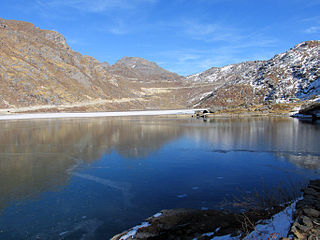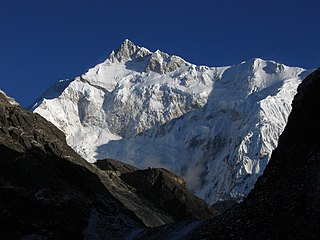
Sikkim is a state in northeastern India. It borders the Tibet Autonomous Region of China in the north and northeast, Bhutan in the east, Koshi Province of Nepal in the west, and West Bengal in the south. Sikkim is also close to the Siliguri Corridor, which borders Bangladesh. Sikkim is the least populous and second-smallest among the Indian states. Situated in the Eastern Himalaya, Sikkim is notable for its biodiversity, including alpine and subtropical climates, as well as being a host to Kangchenjunga, the highest peak in India and third-highest on Earth. Sikkim's capital and largest city is Gangtok. Almost 35% of the state is covered by Khangchendzonga National Park – a UNESCO World Heritage Site.

India is a federal union comprising 28 states and 8 union territories, for a total of 36 entities. The states and union territories are further subdivided into 806 districts and smaller administrative divisions.
Events in the year 1975 in the Republic of India.
The State Legislative Assembly, or Vidhana Sabha, or Saasana Sabha, is a legislative body in each of the states and certain union territories of India. In 22 states and 3 union territories, there is a unicameral legislature which is the sole legislative body. In 6 states, the legislative assembly is the lower house of their bicameral legislature with the upper house being the State Legislative Council. 5 union territories are governed directly by the Union Government of India and have no legislative body.

Gangtok District is an administrative district of the Indian state of Sikkim. It was renamed in 2021 as a result of administrative reorganisation of the state, which also saw three subdivisions of the East Sikkim district spawned off as a separate Pakyong district.

Gyalshing District or Geyzing District is a district of the Indian state of Sikkim. Its headquarter is Geyzing, also known as Gyalshing. The district is a favourite with trekkers due to the high elevations. Other important towns include Pelling and Yuksom. Local people also call it as Pallo-Sikkim and Sano-Sikkim commonly.

The Enchey Monastery was established in 1909 above Gangtok, the capital city of Sikkim in the Northeastern Indian state. It belongs to the Nyingma order of Vajrayana Buddhism. The monastery built around the then small hamlet of Gangtok became a religious centre. The location was blessed by Lama Drupthob Karpo, a renowned exponent of tantric (adept) art in Buddhism with flying powers; initially a small Gompa was established by him after he flew from Maenam Hill in South Sikkim to this site. The literal meaning of Enchey Monastery is the "Solitary Monastery". Its sacredness is attributed to the belief that Khangchendzonga and Yabdean – the protecting deities – reside in this monastery. As, according to a legend, Guru Padmasambhava had subdued the spirits of the Khangchendzonga, Yabdean and Mahākāla here. In view of this legend, the religious significance of Enchey Monastery is deeply ingrained in every household in Gangtok. It is also believed that these powerful deities always fulfil the wishes of the devotees.

Yuksom is a historical town, just 40 km north of Gyalshing city in the Gyalshing district in the Northeast Indian state of Sikkim. It was the first capital of Kingdom of Sikkim established in 1642 AD by Phuntsog Namgyal who was the first Chogyal of Sikkim. The coronation site of the first monarch of Sikkim is known as the "Throne of Norbugang". Yuksom is where there is the Norbugang Chorten near the Norbugang throne, the place Namgyal was crowned and several monasteries and a lake. The dynastic rule of the Chogyal lasted for 333 years.

Nar Bahadur Bhandari was an Indian politician who served as the chief minister of the state of Sikkim from 1979 to 1994. He briefly served as Member of Parliament representing Sikkim Lok Sabha constituency from 1984 to 1985. He was the founding leader of the Sikkim Sangram Parishad. He was popularly remembered for his efforts to include the Nepali language in 8th Schedule of the Constitution of India. He was awarded with prestigious Jagadamba Shree Purasakar for his contribution for Nepali language. He was the first Indian chief minister of Gorkha origin. He also served as the president of Bharatiya Nepali Bhasha Parisangh until his death. He is popularly known as the architect of modern Sikkim.

Khangchendzonga National Park, also Kanchenjunga Biosphere Reserve, is a national park and a biosphere reserve located in Sikkim, India. It was inscribed to the UNESCO World Heritage Sites list in July 2016, becoming the first "Mixed Heritage" site of India. It was included in the UNESCO Man and the Biosphere Programme. The park is named after the mountain Kangchenjunga, which is the third-highest peak in the world at 8,586 m (28,169 ft) tall. The total area of the park is 849.5 km2 (328.0 sq mi).
The administrative divisions of India are subnational administrative units of India; they are composed of a nested hierarchy of administrative divisions.
Kangchenjunga is the third highest mountain in the world.

The scarlet finch is a small passerine bird in the finch family Fringillidae. It is found in the Himalayas from Uttarakhand state in the Indian Himalayas eastwards across Nepal, stretching further east to the adjacent hills of Northeast India and Southeast Asia as far south as Thailand. It is resident in the Himalayas, but many birds winter to the immediate south. Its natural habitat is temperate forests.
The Delimitation Commission of India is a commission established by the Government of India under the provisions of the Delimitation Commission Act, tasked with redrawing the boundaries of legislative assembly and Lok Sabha constituencies based on the last census. The present delimitation of constituencies has been done on the basis of 2001 census under the provisions of Delimitation Act, 2002.

Tsuklakhang Palace or Tsuklakhang Royal Chapel and Monastery is a Buddhist palatial monastery in Gangtok, Sikkim, India.

Eastern Institute for Integrated Learning in Management University was a private university located in Jorethang, Sikkim, India with another campus in Malbasey. The university has been reported by the University Grants Commission (UGC) to be non-functioning since December 2014 and was officially dissolved by the Government of Sikkim in April 2015.
The Board of Open Schooling and Skill Education (BOSSE), is the board of open schooling recognized by the Government of Sikkim in India. BOSSE is established under the act of the Board of Open Schooling and Skill Education; Sikkim Act 2020 was passed on 21 September 2020 by the Sikkim Legislative Assembly stated under Act No. 14 of 2020. The state government of Sikkim has created a mechanism through BOSSE to provide for secondary education, senior secondary as well as skill and vocational education up to pre-degree level and to provide opportunity to continue education to such students who have missed the opportunity of school education. The BOSSE is a state open school board that administers examinations for secondary and senior secondary examinations similar to the NIOS, CBSE and the CISCE. BOSSE offers a unique platform where students may choose skill and vocational subjects along with their secondary and senior secondary papers. The board is mandated to promote open schooling and to undertake research, innovation and development activities in the area of open schooling to strengthen the open and distance education system.

The State Council of Sikkim was the unicameral legislature of the former Kingdom of Sikkim, which was located in the Himalayas, between India and China.
Sikkim Lokayukta is the Parliamentary Ombudsman for the state of Sikkim (India). It is a high level statutory functionary, created to address grievances of the public against ministers, legislators, administration and public servants in issues related to misuse of power, mal-administration and corruption. It was first formed under the Sikkim Lokayukta and Deputy Lokayukta Act-2012 and approved by the president of India. The passage of Lokpal and Lokayukta's Act,2013 in Parliament had become law from 16 January 2014 and requires each state to appoint its Lokayukta within a year. A bench of Lokayukta should consist of judicial and non-judicial members. An Upa-Lokayukta is a deputy to Lokayukta and assists him in his work and acts in-charge Lokayukta in case the position fells vacant before time.
The 2024 elections in India includes the general election and elections to the Rajya Sabha, to state legislative assemblies, to Panchayats and urban local bodies.












